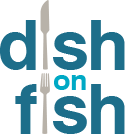Summer seems to be the season of babies. And if YOU are celebrating the addition of a new lil’ Seafoodie, we would like to extend a big CONGRATULATIONS!
We know babies bring a lot of joy, and a lot of work. Between caring for a newborn and yourself (and possibly other kiddos, as well), you have your hands full! While it may feel like the last thing on your list right now, self-care is uber-important.
The good news is that even just making a few tweaks in your food choices help ensure you’re taking care of yourself and boosting your new Mom superpowers. Most breastfeeding still need about 300-400 extra calories every day. Just as during pregnancy, what you eat post-pregnancy is important for the optimal health of you and your baby, whether directly through breastmilk or as your baby’s role model. So, aim to get those extra calories from nutrient-rich foods.
It’s no surprise that we here at Dish on Fish are crazy about seafood. Aside from it being delicious and versatile, seafood provides vital nutrients that benefit our bodies during all stages of life and especially during pregnancy and when breastfeeding. In fact, seafood is so important during these times of rapid growth and development, the Dietary Guidelines for Americans recommend that expectant and new moms eat at least 2-3 servings of seafood each week.
Here are some of the nutrients in seafood that make it a good choice for moms and, ultimately, their babies.
Why eating seafood is a no-brainer for breastfeeding moms:
- Omega-3 Fatty Acids: The omega-3 DHA comprises more than half of a baby’s brain and retina. In fact, the brain relies on DHA for proper growth and development during infancy and childhood, with the largest demand up to 2 years of age. Research shows that moms who consume adequate DHA help contribute to optimal vision development and function in breastfeeding infants up to 12 months. This is positive news for seafood-loving mamas because fish is the premiere dietary source of DHA and EPA. Aim to eat about 2-3 servings of seafood each week to meet omega-3 needs.
- Protein: Protein is made up of amino acids, which are broken down by the body and used to build muscles and organs, make hormones and be used as energy. As you can imagine, a baby’s body requires a lot of protein. Breastfeeding moms need to consume extra protein to meet mom’s—and baby’s—needs. According to the Dietary Guidelines for Americans, moms who are breastfeeding may need at least 65 grams of protein per day. Seafood is an excellent source of complete protein.
- Calcium: Calcium is important for bone growth in babies and bone maintenance in moms. Aim to consume about 1,000 mg per day, mostly from food sources. While dairy products are an excellent source of calcium, dark green leafy vegetables and some seafood also provide calcium. For an extra boost of calcium, eat 2-3 servings of seafood—like shrimp and canned salmon with bones—each week.
- Vitamin D: While vitamin D needs for breastfeeding moms are the same as for non-breastfeeding women, vitamin D needs can be difficult to meet through food alone since there are few vitamin D-rich sources. Reach for fortified milk products, fortified cereal and grain products and seafood. Some seafood like salmon provide an extra dose of vitamin D.
- Iron: The mineral iron is necessary to make hemoglobin, which transports oxygen around the entire body. Iron is necessary for optimal brain development in infants and early childhood, however breast milk does not typically contain much iron and will not meet the iron needs of infants older than 6 months. However, this mineral is important to help mom fight fatigue. For breastfeeding without anemia, aim to include iron-rich food sources—like lean meat, seafood, nuts and seeds and fortified grains—in your diet regularly.
Here are a few of our favorite recipes, hand-picked just for our breastfeeding moms:








No Comments